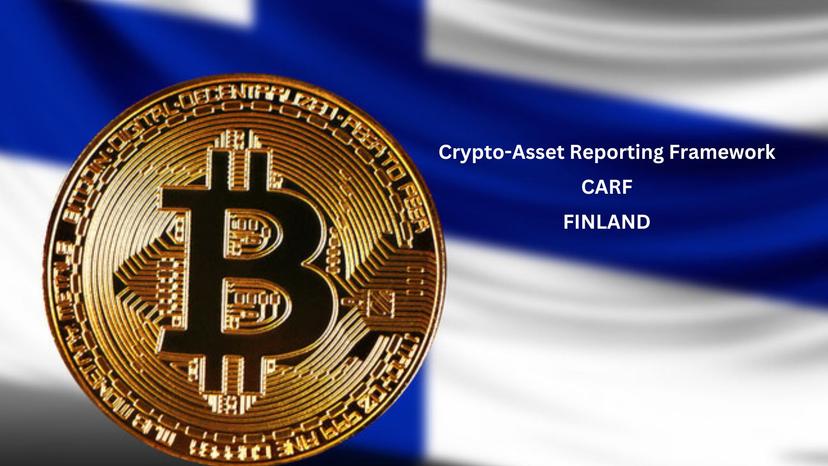Starting on January 1, 2026, Finland will implement the OECD’s Crypto-Asset Reporting Framework (CARF) through the EU’s DAC8 directive. This new requirement obliges all licensed crypto-asset service providers (CASPs) to report user transactions to the Finnish Tax Administration (Vero), covering both Finnish and foreign clients. Annual reporting begins in 2027, with cross-border information exchange following shortly thereafter.
CARF aligns Finland with over seventy jurisdictions worldwide committed to automated crypto-asset information exchange. The framework enforces transparency, integrates Tax Identification Numbers (TINs), and standardizes reporting formats, ensuring both domestic oversight and international compliance.
Scope of CARF in Finland
Finland’s CARF obligations apply to all licensed CASPs, including centralized exchanges, custodial wallet providers, crypto brokers, payment platforms, and certain DeFi services with sufficient governance control to collect user data. Providers are required to report on a broad range of digital assets, including major cryptocurrencies such as Bitcoin and Ethereum, stablecoins, algorithmic tokens, investment-grade NFTs, and select DeFi positions.
Transactions covered include crypto-to-crypto trades, crypto-to-fiat exchanges, transfers to unhosted wallets, and reportable retail payment transactions exceeding statutory thresholds. Reporting must capture all activity per user, aggregated annually and formatted according to the CARF XML schema.
Operational Compliance Workflow
CARF compliance begins with robust customer due diligence. Providers must collect and verify TINs and tax residency information for all users and controlling persons. When a valid TIN cannot be obtained, a placeholder (e.g., NOTIN) must be applied, flagged accordingly in the XML report. Continuous validation ensures data integrity, audit readiness, and alignment with international reporting obligations.
All transactions, including crypto-to-crypto trades, fiat exchanges, inbound and outbound transfers, staking rewards, and airdrops, must be meticulously recorded. Data captured must include timestamps, wallet addresses, transaction volumes in crypto units, and fiat-equivalent values. This data is aggregated and validated against the CARF XML schema before submission to Vero. Records must be maintained for five to seven years to support audits.
Once submitted, Finland will exchange relevant data internationally, including information on foreign users, beginning in 2027. This ensures that Finnish taxpayers and foreign clients are covered by a harmonized global compliance framework.
Tax Implications for Crypto Users
For Finnish individuals, capital gains from cryptocurrency sales, exchanges, and spending are taxable under capital income. Gains and losses are calculated using the FIFO (First In – First Out) method. Income from crypto mining is generally treated as earned income, allowing deduction of related expenses such as electricity and equipment acquisition. Corporates and professional traders are subject to full corporate taxation on crypto holdings and trading activity.
Despite automated reporting under CARF, users remain responsible for reviewing and validating their pre-completed tax returns to ensure accurate declaration of gains, losses, and mining income.
Advanced Compliance Tools: TaxDo
To support CASPs and investors in Finland, TaxDo offers an integrated compliance solution that addresses the full CARF lifecycle. Its modules include:
- Global Tax Ledger (GTL): Validates TINs directly against official tax authority databases in over 130 countries, providing the highest level of assurance for compliance and produces CARF-compliant XML reports ready for submission to Vero.
- Global Identity Verification (GSV): Checks TIN format, structure, and checksum across 195+ jurisdictions, ensuring accuracy for both individual and entity accounts where direct authority verification may not be available.
- Global Identity Intelligence Engine (GIIE): Continuously screens users against over 290 international watchlists, including AML, PEP, and sanctions databases, automatically flagging changes in status.
TaxDo streamlines workflows by automating form collection, e-signatures, TIN validation, ongoing due diligence, and domestic XML reporting. These tools reduce manual errors, minimize regulatory risk, and ensure audit readiness.
Practical compliance measures include consolidating wallets, maintaining detailed ledgers with timestamps, wallet addresses, transaction volumes, and fiat-equivalent values, and retaining records for the legally mandated period. Combined with automated tools, these measures allow CASPs and investors to meet CARF reporting obligations efficiently and accurately.
Conclusion
Finland’s implementation of CARF marks a significant step toward comprehensive crypto tax transparency, connecting domestic obligations with a global compliance framework. CASPs and investors must prioritize thorough due diligence, full transaction reporting, and TIN validation to ensure alignment with regulatory expectations.
Leveraging advanced compliance solutions like TaxDo’s GSV, GIIE, and GTL modules enables seamless reporting, audit readiness, and operational efficiency, allowing stakeholders to navigate Finland’s CARF requirements with confidence and precision.
